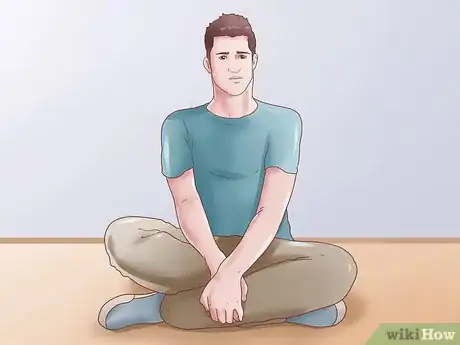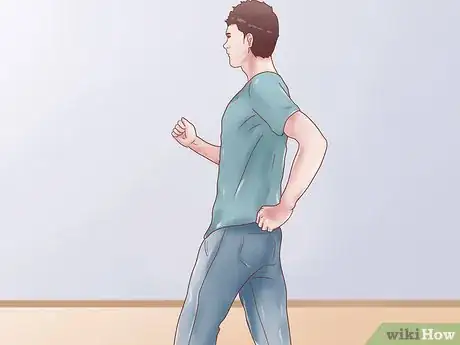This article was co-authored by Sandra Possing. Sandra Possing is a life coach, speaker, and entrepreneur based in the San Francisco Bay Area. Sandra specializes in one-on-one coaching with a focus on mindset and leadership transformation. Sandra received her coaching training from The Coaches Training Institute and has seven years of life coaching experience. She holds a BA in Anthropology from the University of California, Los Angeles.
There are 7 references cited in this article, which can be found at the bottom of the page.
This article has been viewed 128,829 times.
Many people want to surround themselves with people who have self-confidence. But what if you're not one of those people? What's more, even if you do have that confidence sometimes, other times you just don't feel it in you. That's totally natural – most people, at one point or another, struggle with this issue. To convince everyone that you're secure, confident, and feeling good about life, start with Step 1 below.
Steps
Using Body Language
-
1Stand up straight.[1] Pull your shoulder blades down and back as far as possible to force your torso up and your neck back. This gives you a posture that says, "Look out world!" When you slump over, you give off the impression the world has defeated you and you'd just much rather be in bed.
- Practice getting out of a chair without rocking forward, especially if you work at a desk from 9-5. In the beginning, having good posture will be a little hard – if you're not used to it, you probably haven't developed the core strength. But with practice makes habit and eventually, it'll be automatic.
- Wearing a posture brace may also help to improve your posture. You can find these in stores and online.
-
2Pick your chin up and look straight ahead of you.[2] When you’re not feeling confident, you tend to think downward about everything – and look downward, too. To project that you ‘’are’’ feeling confident, pick your head up and look out. This gives off the impression that you feel worthy to judge the world and aren’t stuck in your own head.
- Try looking down for a while. How do you feel? Then try looking up and surveying your surroundings. Does your inner feeling change a bit? Sometimes our minds take cues from our bodies – when you look down, you naturally feel a little more subdued and sad. When you look up, your mood gets better and you feel more confident (in addition to looking it, too).
Advertisement -
3Smile.[3] To act as if you’re ready for the world, smile. It shows others you’re approachable and happy to see them. Others will be more likely to receive you kindly as well, creating a cycle of positivity. As an added bonus, smiling can make you feel happier even when you don’t feel like smiling.[4]
- You want to give others a genuine smile. Not one of those fake, easily detectable ones you plaster on your face when someone whips out a camera when you’re just not feeling it. To get around this, practice. Stand in front of your mirror with your head down. Smile and ‘’then’’ lift your head up. Whether you like that smile or not, that’s your natural smile. Not some modified version that’s more camera friendly.
-
4Make good eye contact.[5] Nothing says "I fear your appraisal" more than someone who is unwilling to look you in the eye. Some people even find it insulting, as if you’re not paying attention to them. To show the people you’re talking to that you ‘’are’’ listening and that you are an active, valuable part of the conversation, make eye contact with them. Take breaks away when gestures are in the spotlight or when you’re thinking as necessary, but then always return to looking at them in the eye.
- To practice this (it can be quite difficult), master the art of the staring contest with strangers. While smiling and blinking, of course. Try to keep looking at them until they look away first. When’s the last time you looked at someone and were not the first one to look away?
-
5Keep your body relaxed. A person who’s nervous and not feeling confident will be fidgety and tense. A person who’s confident and ready for the next challenge will be relaxed, loose, and calm. Go through your body, starting with your head, and relax each part. Think about which parts of your body are the tensest – lots of people hold tension in their backs, butt, jaw, and shoulders.
- If you ever find yourself with your legs crossed, hands clasped together, and shoulders raised – or even standing, pacing, and chewing on your fingernails – make a conscious effort to loosen up. You may find that a loose body position loosens your anxiety, too.
-
6Take up a power pose. Research has shown that those who take up power poses – that is, spreading out and making themselves “bigger” – report feeling more confident.[6] To give your mind that confidence boost, put your hands on your hips, widen your stance, and show the world who’s who.
- Imagine talking to your boss and you have your feet up on the desk while his hands are tucked between his legs. Pretty easy to tell who’s feeling confident! So spread out, whether it's in a chair in your office with your boss, standing at a bar with your friends, or giving a speech to your classmates.
- Do this even before your event. A couple of minutes in the bathroom before making a presentation (whether it's a speech or just introducing yourself to a stranger) can be enough to get you in the power-zone when you need it.
-
7Walk at a brisk pace. Walking briskly can indicate to other people that you are confident. Walking briskly will cause you to stand upright and erect as well.[7]
- A brisk pace means you have a reason for movement, you're dedicated and motivated to get something done. A slower pace means you're not feeling ambitious and have less reason to move. The former sure sounds more confident!
- Doing some brisk walking or exercise before you need to fake confidence can also help because it will burn off excess cortisol. This will reduce stress and make it easier for you to seem confident.[8] Try taking the stairs instead of the elevator on your way up to the office, or do a brisk walk or jog around the block.
Speaking Confidently
-
1Lower your voice. When you’re not confident and a bit nervous, your voice tends to stay in a higher register. It’s not always easy to detect when it’s happening. Make a conscious effort to keep your voice a bit lower, whether you notice that you speak in a high voice or not. If you know you feel uncomfortable, pay attention to how your voice changes.
- Lower the pitch of your voice, in addition to the volume if that’s an issue for you. In other words, speak up! This will tell others that you view your voice as worthy of being heard. And then they’ll be more likely to follow suit, thinking the same.
-
2Speak more slowly. Much like how our voices raise when we’re nervous, they tend to speed up, too. So the next time you’re in front of class giving a presentation, slow down. Slow way down. Slow down to the point where you think you’re going too slow – odds are then you’re doing it just right. This technique is also known as “slow talk.” You can practice it by reading out loud to yourself.
- An unconfident person wants the moment to pass as quickly as possible and get over it – hence why they speed up in the first place. To fake confidence, slow down, giving off the impression that you're comfortable basking in the spotlight.
-
3Use "I" statements. Confident people are more likely to be assertive and use "I" statements.[9] Instead of "You make me angry," which is quite passive, a confident person might say, "I am angry with you," which is much more direct and cutting. To feign confidence, talk about yourself. No one else is going to!
- It's nice to ask questions about those around you, definitely. Everyone appreciates a good listener. But you've got to be an active part of the conversation, too, by speaking. If something comes up that you can relate to, talk about your experiences with it. The person you're talking to just saw your favorite movie? Instead of, "Oh, what a great movie!" you might say, "I love that movie! It's my favorite. I just saw it for the umpteenth time last...."
-
4Speak positively and avoid gossip. Being negative, nagging, and spreading gossip about other people indicates a lack of confidence. Instead, work on saying positive things about other people and avoiding gossip. People who feel good show it through their positive actions and words.
- Try to put a positive spin on things whenever possible. Instead of, "Oh, I hate Thai food," you could say, "I prefer Italian," when discussing potential dinner plans. Instead of, "Her shoes are so ugly," you'd say, "She made an interesting fashion choice, didn't she?"
-
5Don’t ramble. Have you ever been sitting with a new acquaintance or two and just started talking to get rid of that awkward feeling in your stomach? That’s a pretty key sign that you’re feeling nervous and not feeling too confident. Instead, embrace the silence. And that feeling? Ignore it. You might be the only one feeling it anyway.
- Listen more than you talk. If you hog the spotlight, instead of people thinking you’re the big cheese, you’ll probably just come off as irritating and needy. Instead, relax. Take a step back. A person who’s confident doesn’t need the spotlight or the attention all the time. Let others take the heat once in a while.
Developing Positive Habits
-
1Don’t let yourself overthink it. Let’s say you’re at a bar and you see a cute guy or girl over in the corner. For about the first three seconds, you’re envisioning talking to them and getting their number. Then, doubt sets in and you’re overcome with fear. That’s when you’ve got to stop the overthinking. After those first three seconds, drop it. Just go. Go and do. Don’t let yourself get caught in your head.
- Any thinking beyond that initial three seconds is just going to cause more worry. And worry is going to do you absolutely zero good. Shut that voice up in your head and go for it before it tells you not to. It has no idea what it's talking about!
-
2Keep in mind that everyone is too concerned with themselves to notice. As we grow older, we start thinking that the world is constantly pointing a finger at us, ready to point out our faults at any given time. In reality, the rest of the world is too concerned with themselves to really pay us any attention and fears the exact same thing. The only person thinking about how you come off is you.
- Remember that it may seem like people are focused on you sometimes, but this is not reality. They are likely much more focused on themselves. It's only your opinion of yourself that matters.
-
3Laugh. Laughing will fill your brain (and thus your entire self) with genuine happiness. It releases tension, improves your mood, and makes it easier to smile a genuine smile. All of this makes faking confidence ten times easier, which makes it ten times more convincing.
- Appearing confident can be hard, but appearing happy-go-lucky and positive is a little easier. So when someone cracks a joke, laugh. Keep a smile in your back pocket for when you need it. People like happy people and happiness is associated with confidence.
- Try keeping a joke on you at all times so you can read it when you need to laugh. You can also watch standup comedians to laugh often and stay happy.
-
4Dress and groom yourself well. Recall your last bad hair day. You probably felt pretty self-conscious, huh? How about the last time you dressed up to the nines and went out on the town? Probably pretty good. Sometimes our brains take a cue from the outside to decide how we feel on the inside. If you need a shot of confidence, put on an outfit you know you look good in and clean yourself up. Looking good makes it much, much easier to feel good.
- What's more, people tend to assume things about people who are dressed well and look good. They assume they're more educated, smarter, have more money, and are generally more likeable. It's the human condition to judge a book by its cover. Take advantage of that by sprucing yourself up.
-
5Be enthusiastic. Many people easily mistake enthusiasm for confidence. If you can’t muster confidence, this is a good bet to make. Your favorite song comes on the radio? Tell everyone how much you love it. Someone suggests going to a movie you’ve been wanting to see? Say how much you’ve been looking forward to it. You can also give genuine compliments to other people to show your enthusiasm. Your energy will be contagious, uplifting, and make everyone feel like you’re full of positivity and confidence.
- Make sure your body matches your words, though. Imagine someone saying, "I can't wait to see that movie!" in a monotone voice while they're looking down with their hands hidden in their pockets and their eyes diverted to the side. You probably won't be convinced. Now imagine a person whose eyes light up, their hands shoot up, and their voice booms, "I can't wait to see that movie!" Much more convincing.
-
6Tell yourself you can do it. The human mind is sometimes a disconcertingly powerful thing. In fact, studies have shown that the power of expectation can even put cancer into remission. This is known as the placebo effect. In the original studies, patients thought they were taking a medication, but they really weren't, and they ‘’still’’ got better.[10] If you tell yourself you can, it’s possible you will. And if you tell yourself you can’t, it’s probable that you won’t.
- Much of life is a self-fulfilling prophecy. Don't feel like you have a reason to be confident and you won't be. Think you won't do well and you'll probably do poorly. The right attitude can truly change everything. And the only thing that determines your attitude? You.
Expert Q&A
Did you know you can get expert answers for this article?
Unlock expert answers by supporting wikiHow
-
QuestionHow do I make myself seem more confident?
 Sandra PossingSandra Possing is a life coach, speaker, and entrepreneur based in the San Francisco Bay Area. Sandra specializes in one-on-one coaching with a focus on mindset and leadership transformation. Sandra received her coaching training from The Coaches Training Institute and has seven years of life coaching experience. She holds a BA in Anthropology from the University of California, Los Angeles.
Sandra PossingSandra Possing is a life coach, speaker, and entrepreneur based in the San Francisco Bay Area. Sandra specializes in one-on-one coaching with a focus on mindset and leadership transformation. Sandra received her coaching training from The Coaches Training Institute and has seven years of life coaching experience. She holds a BA in Anthropology from the University of California, Los Angeles.
Life Coach
References
- ↑ Sandra Possing. Life Coach. Expert Interview. 13 August 2020.
- ↑ Sandra Possing. Life Coach. Expert Interview. 13 August 2020.
- ↑ Sandra Possing. Life Coach. Expert Interview. 13 August 2020.
- ↑ https://www.scientificamerican.com/article/smile-it-could-make-you-happier/
- ↑ Sandra Possing. Life Coach. Expert Interview. 13 August 2020.
- ↑ http://lifehacker.com/5987141/faking-powerful-body-language-reduces-stress-and-makes-you-more-confident
- ↑ http://www.huffingtonpost.ca/2012/05/08/what-your-walk-says-about-you_n_1497198.html
- ↑ https://adaa.org/living-with-anxiety/managing-anxiety/exercise-stress-and-anxiety
- ↑ http://www.traceyjarvis.com.au/uploads/1/7/9/4/1794764/assertiveness_-_a_clear_and_confident_form_of_communication._tracey_jarvis_clinical_psychologist_infodoc..pdf
About This Article
To fake confidence, try to smile as much as possible when talking, which will make you appear approachable and comfortable in your own skin. Similarly, laugh when something funny happens to make you seem more open and friendly. You should also try to maintain good eye contact to show that you're not submissive or anxious. You can practice not looking away first to improve your eye contact. Additionally, try to keep your voice at a lower pitch, which sounds calmer and more confident than higher registers. For more tips from our Counselor co-author, including how to show confidence in your physical appearance, read on!













































































